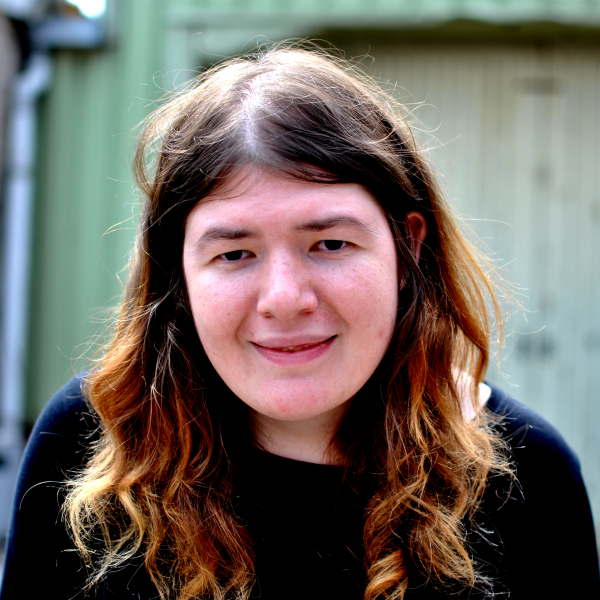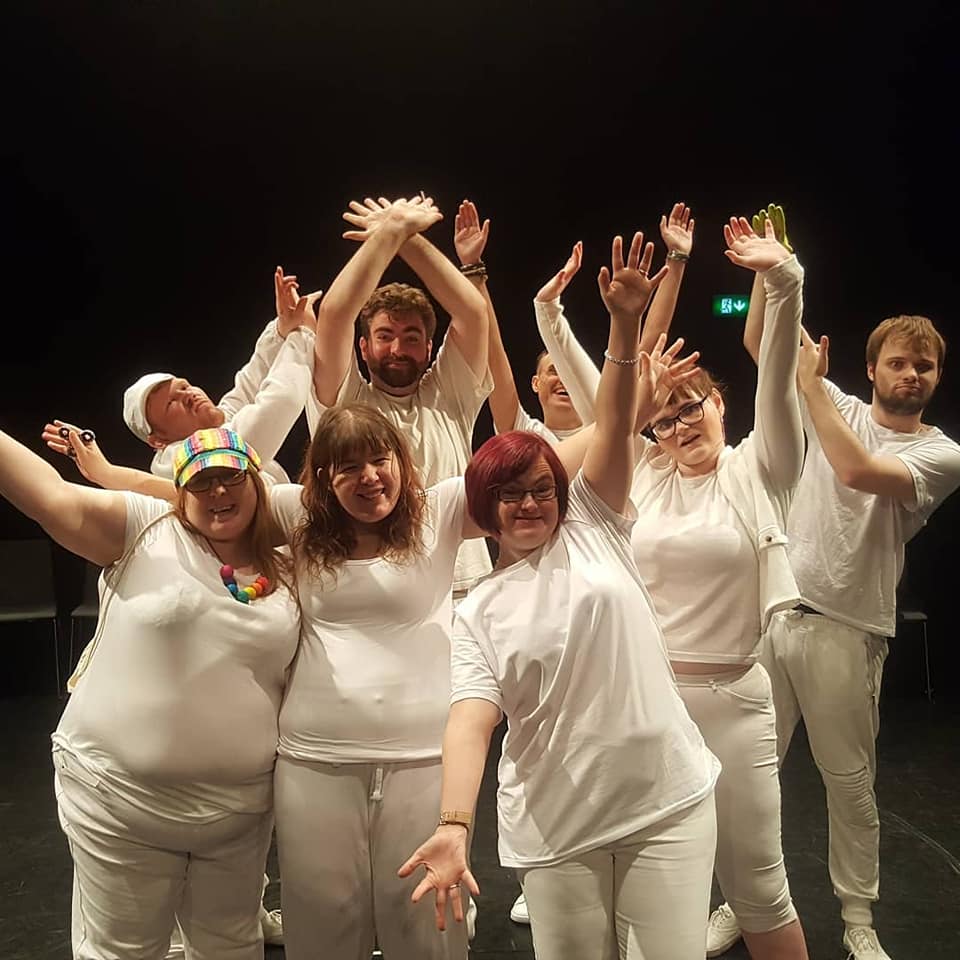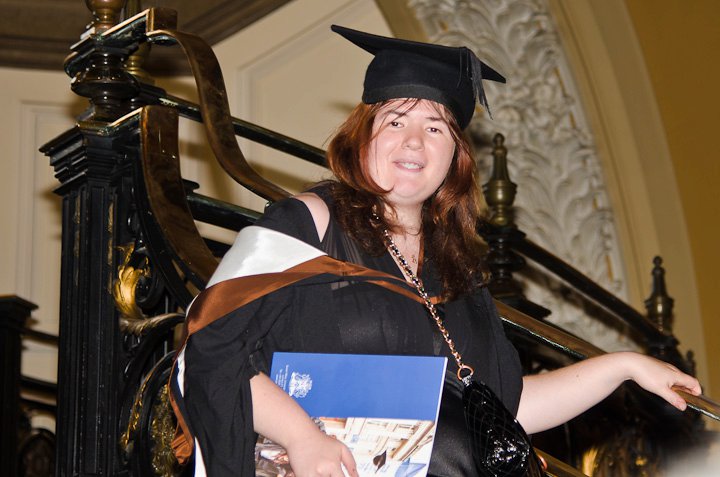Alumni profile - Madeleine Levy
(English and Drama BA, 2011)
My book is a beacon of hope for Autistic individuals and their carers, as it promotes the message that individuals with long-term health conditions can achieve great things in society.

Why did you choose to study English and Drama at Queen Mary?
I chose to study English and Drama at Queen Mary because at the time I had never lived away from home before. The idea of studying in London was a thrilling and exiting one. Queen Mary University offered very good mental health and learning disability support and so my family and I believed that attending a university would be a less pressurized setting than attending a Drama school which I also considered at the time.
What did you enjoy most about the course and about Queen Mary?
I really enjoyed the variety of different texts to read and learning about the city of London, its history and its politics. I loved the variety of societies at Queen Mary. I was part of the Drama Society and the Film society; I was on the Fencing team, and I attended Ballroom dance. I was also part of the Queen Mary choir and Orchestra and had a few of my articles featured in CUB Magazine.
You’ve recently written a book about your experience of navigating the education system as someone with Asperger Syndrome. Can you tell us about the book and why you were inspired to write it?
My book, When I Grow Up I Want to Be a Cat: Surviving the education system with Asperger's, is an honest account of what it is like to go to school with Asperger syndrome. It interviews nine others on the spectrum, and they also share their school and university experiences. The book originally began life as a series of blogs and articles supporting Autistic students at Queen Mary, as I was a student mentor for individuals with learning needs in my second year. They were also featured on the Birmingham University Website where I did my master's degree.
I did not know for many years that I was hypersensitive to sound and so whenever the fire alarm went off in Pooley house, all I knew was I was experiencing great pain and discomfort, but I did not know why.
I wrote the book because, at the time, there was not enough support for Autistic individuals in education settings. Mental health was rarely spoken about or was hushed and spoken of in quiet voices due to the shame and stigma surrounding having a mental health condition. It has only been in the last few years where society has opened up and mental health has been a topic of concern and discussion. Only recently has the government developed training courses on understanding Autism and these are not mandatory. I want mandatory training in all education settings across the board, including universities.
There was no such thing as “self-care” when I went to Queen Mary, other than to seek counselling support and to have the typical British stiff upper lip. I wrote the book to provide a platform for individuals to explore their own experiences surrounding Autism and mental health as, so often, individuals on the spectrum are nonverbal and may lack the language needed to describe their experiences or get their needs met. I hope that by reading this book they will be able to relate to my words and will be able to have somewhere to go to point the adults caring for them in the right direction to seek support.
My book does not advocate for people on the spectrum unless they want or need me to advocate for them. My experiences are my own and may not be similar to others. What the book does do is create a starting point for discussion and enables adults to think about what they need in order to put the right support in place. I hope that my book will rally educators and health professionals, as I want individual care planning according to strengths and interests for all children, not just individuals on the autism spectrum.
My book is a beacon of hope for Autistic individuals and their carers, as it promotes the message that individuals with long-term health conditions can achieve great things in society.
What were some of the particular challenges that you faced as a student with Asperger’s?
As a student with Aspberger’s, I faced many challenges. I did not understand what was happening to my body when I was at Queen Mary. I did not know for many years that I was hypersensitive to sound and so whenever the fire alarm went off in Pooley house, all I knew was I was experiencing great pain and discomfort, but I did not know why.
Communication was also difficult at university. I found understanding body language and tone of voice incredibly challenging and I did not understand certain types of humor such as sarcasm and irony. This meant that some of my relationships were strained, and I lost friends due to misunderstanding how to behave and misreading their social signals. Some of which I am still sad about to this day.
How, if so, did Queen Mary assist you with these challenges? Would you say the university was understanding of these challenges or not?
Queen Mary helped in any way that they knew how. I found the disability team to be second to none, particularly Simon Jarvis and David Walmsley. I was assessed for my learning needs by student finance, and I was supported to buy a laptop and have a comfortable chair for my room due to my Scoliosis of the spine. I was allowed extra time for examinations due to my poor processing speed and handwriting. I saw the university counselling team in my second year who put me in touch with The National Autistic Society in London. It was there that I began my research for the book, and I discovered my hypersensitivity to sound. I also worked as a peer support mentor in my second year to support other students with Autism with their time management skills, workloads and joining societies. The team also supported me to get a job in fresher’s crew in 2009.
What impact do you hope your book will have on people with or without autism who read it?
I hope that people will learn some new things about Autism that they did not know before. I hope that they will understand that individuals on the spectrum are not a lost cause and that many of us can and do achieve great things. I hope that people on the spectrum may be able to identify with my story and will feel less alone and isolated because they will know that there are others like them out there. I hope to be a guiding voice and a potential friend to them.
What do you think are some of the common misconceptions people have about autism and Asperger syndrome and do you think programs such as ‘The Undateables’ and ‘Love on the Spectrum’ are more helpful or harmful representations of people living with autism?
I cover this a lot in my book but the most common ones that I have heard are that all people on the spectrum are not intelligent, that we are all violent due to Autistic meltdowns, and that we all lack empathy and will find it difficult to find love. Also, that we have hidden abilities and phenomenal skills in one subject such as mathematics or playing music. I feel that programs such as The Undatables are harmful because the underlying assumption is that people on the spectrum will find it difficult to find love or are somehow unlovable. My partner of nearly ten years can testify that this is not the case. Or it certainly isn’t for me and many others with Aspergers syndrome.
You are the founder of Alternative Voices Theatre Company. Can you tell us about the company and how you came up with the idea?
Alternative Voices Theatre Company began life in 2014 once I had finished my Playwriting Mphil (B) at Birmingham University. I came up with the idea because I was aggravated by how little opportunity there was to be involved in theatre once you had graduated from educational settings. I was also incensed by the lack of support available for Autistic adults in the UK. I had a long rant to my best friend one day and so Alternative Voices Theatre Company was born. My friend is now the Associate Director.
I came up with the idea because I was aggravated by how little opportunity there was to be involved in theatre once you had graduated from educational settings. I was also incensed by the lack of support available for Autistic adults in the UK. I had a long rant to my best friend one day and so Alternative Voices Theatre Company was born. My friend is now the Associate Director.
What are some of your proudest achievements so far both in your professional and personal life?
Some of my proudest achievements in life so far have been graduating from Queen May University with a 2:1 in 2011,  graduating from Birmingham University with a master's degree in 2013, receiving my knighthood in the Crusade Historical Re-enactment society in 2011, creating my theatre company, Alternative Voices, in 2014, and becoming a professional theatre company with Arts council funding in 2018; my radio play, ‘The Party Animal’, being aired on Switch Radio Birmingham on April 6th 2020 during lockdown to connect people where they needed it most, and passing my placements for my occupational therapy degree at Coventry University. Finally, moving into my new house with my partner in August 2020.
graduating from Birmingham University with a master's degree in 2013, receiving my knighthood in the Crusade Historical Re-enactment society in 2011, creating my theatre company, Alternative Voices, in 2014, and becoming a professional theatre company with Arts council funding in 2018; my radio play, ‘The Party Animal’, being aired on Switch Radio Birmingham on April 6th 2020 during lockdown to connect people where they needed it most, and passing my placements for my occupational therapy degree at Coventry University. Finally, moving into my new house with my partner in August 2020.
What do you think Queen Mary and other universities can do to further support students living with autism?
I think all staff need to have mandatory Autism training weather they directly teach anyone with Autism or not. I also think that mental health awareness courses need to be built into the curriculum no matter what subject is being taught. I feel that there should also be quiet places on campus that are safe spaces for people with autism to go and just be. The rules need to be strictly reinforced with punishment for breaking them, unlike they are in the library.
What would be your one message to young people going through similar experiences?
Always speak to someone about your concerns and your difficulties. The longer you keep it to yourself the longer it will hurt you. You are not alone in this world, there are many others like you, and you can and will achieve great things, if that is what you want to do. Never give up, you are worthy, your experience is valuable, and you are worth fighting for.
- Buy Madeleine's book on Amazon
- Find out more about Alternative Voices Theatre Company
- Find out more about studying English and Drama at Queen Mary
- Join the Queen Mary Network
If you would like to get in touch with Madeleine or engage them in your work, please contact the Alumni Engagement team at alumni@qmul.ac.uk.